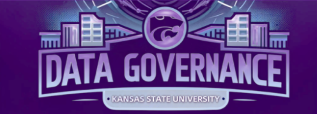November 28, 2023
Data governance program at K-State: Why you should care

In the digital age, data has become a cornerstone of academic institutions, affecting research, teaching and administration. Understanding and contributing to the governance of data is crucial.
K-State's data governance program, under the leadership of the Data Governance Steering Committee that includes members across the university, oversees policies and procedures governing university data. Given its scope of purposes, what exactly is this program governing and how does its activity impact the mission of the university?
Current efforts of the Data Governance Steering Committee are focused on institutional data, including but not limited to student records, human resources data, administrative information, financial documents and more.
Maximizing use of institutional data assets serves multiple purposes:
- Strategic and administrative decision making: Using institutional data to inform decisions on the future directions and priorities of the university, as well as ongoing resource allocation, program development, and institutional policies and procedures.
- Academic innovation and student success: Apply data analytics and BI dashboards to support program initiatives and develop action plans to improve student success.
- Institutional planning at all levels: Administrators and staff across campus use data analytics and modeling in strategic planning, policymaking and compliance reporting.
- Resource management: A better understanding of institutional data is critical to the effective management of the institution's resources from space utilization, research funding application and workforce development to budget allocation.
A successful data governance program is not a choice but a necessity. With increasing data breaches, privacy concerns and regulatory complexities, governing institutional data is vital. A sound data governance program ensures data security, privacy, compliance with laws and the ethical use of information. The data governance program also includes maximizing data quality and ensuring its consistency.
The data governance program presents both challenges and opportunities for faculty. Balancing data openness with security, integrating governance into research and adapting to evolving technological landscapes are key challenges. However, effective governance also offers opportunities for enhanced research collaboration, data-informed decision making and institutional credibility.
The efforts of faculty, staff and administration will shape the use of institutional and research data, the future of academic research, and the activity of administration thus ensuring a secure, compliant and efficient academic environment.
If you have questions about data governance at K-State, please contact Xiang Chen, director of data governance and policy in K-State's Office of Data, Assessment and Institutional Research.
